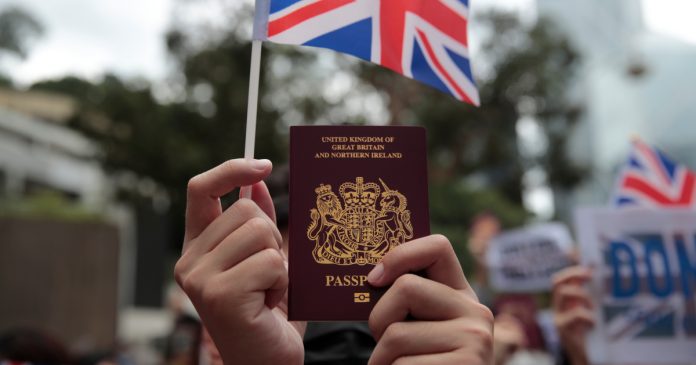[ad_1]
Under scheme that comes into effect on Sunday, Hong Kong people with BN(O) status will have path to UK citizenship.
Britain’s government said on Friday it was standing by the people of its former colony Hong Kong in the face of a Chinese crackdown as it prepared to launch a settlement scheme that could allow millions of the territory’s people to live permanently in the United Kingdom.
People with British National (Overseas) status – a legacy of UK rule over Hong Kong up to 1997 – will be able to apply to live and work in the UK for up to five years, and eventually seek citizenship, under rules that were changed after China imposed the National Security Law on the territory last year.
Before the change, which takes effect on Sunday, people with BN(O) status could only visit the UK for up to six months and were not allowed to work or settle.
“I am immensely proud that we have brought in this new route for Hong Kong BN(O)s to live, work and make their home in our country,” Prime Minister Boris Johnson said in a statement.
“In doing so we have honoured our profound ties of history and friendship with the people of Hong Kong, and we have stood up for freedom and autonomy – values both the UK and Hong Kong hold dear.”
China says the path to citizenship offered by the UK is a violation of international law and interferes with its internal affairs.
Any Hong Kong resident born before 1997 is eligible for BN(O) status and the new rules mean an estimated 2.9 million adults in Hong Kong and a further 2.3 million dependents could be eligible to move to the UK. Hong Kong has a population of about 7.5 million people.
 During mass demonstrations in Hong Kong in 2019, rallies in London urged the UK government to do more to help people in the former British colony [File: Henry Nicholls/Reuters]
During mass demonstrations in Hong Kong in 2019, rallies in London urged the UK government to do more to help people in the former British colony [File: Henry Nicholls/Reuters]
The new pathway is not cheap.
A five-year visa costs 250 British pounds ($340) for each person. But a mandatory surcharge to access Britain’s state-run health service will run to 3,120 British pounds ($4,280) per adult, and 2,350 British pounds ($3,224) for those under the age of 18.
Shorter, cheaper visas for 30 months will also be available.
“We have been clear we won’t look the other way when it comes to Hong Kong. We will live up to our historic responsibility to its people,” Foreign Secretary Dominic Raab said.
“China’s imposition of the National Security Law in Hong Kong constitutes a clear and serious breach of the (pre-handover) Sino-British Joint Declaration contrary to international law.”
Crackdown fears
China imposed the security law on June 30 last year, broadly focusing on acts Beijing deems secession, subversion, terrorism or collusion with foreign forces.
The legislation followed months of pro-democracy protests that were marked by increasing violence towards the end of 2019, but had calmed in 2020 as a result of the measures imposed to tackle the coronavirus pandemic.
Since the law was passed, the territory’s pro-democracy activists and politicians – including those elected to the Legislative Council, Hong Kong’s mini parliament, have been detained. January has been marked by a series of mass arrests. Jimmy Lai, a media tycoon and China critic, is among the most prominent people facing charges under the law.
As well as the UK, some other Western countries also relaxed immigration rules in relation to Hong Kong after the security law was imposed.
Between July and this month, about 7,000 people with BN(O) status and their families have already been allowed to remain in the UK.
The British government expects more than 300,000 people and their dependents to take advantage of the BN(O) offer.
[ad_2]
Source link











